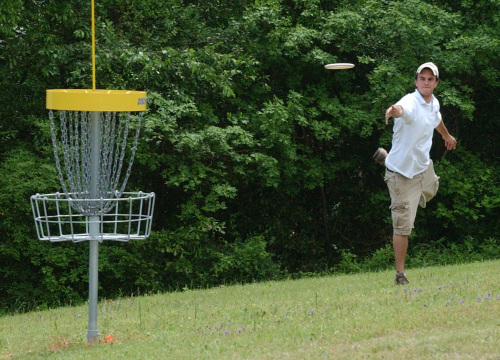Korea proves discs aren’t just for dogs with first pro-standard courseFolks in summers past were happy to toss a disc across the beach on a sunny day. Then along came the more frenetic Frisbee sport, ultimate, which saw disc fanatics team up to compete in championships around the world. Now, disc golf is a more genteel craze steadily gliding its way across Korea.
“One of the things that I really like about disc golf is that it is great for families,” said disc golfer Jack Quin. “It depends how serious you want to be, there are now professionals who make a living from the sport, but simply going for a walk together and throwing something with a purpose is good recreation.”
Playing to almost the same rules as regular golf ― disc golfers swap clubs and balls for discs, and holes for nets. They play over nine to 18 holes, trying to net their discs ― smaller and fatter than regular Frisbees at the size of a large saucer ― in as few throws as possible.
From humble beginnings, the sport was first formalized by the Professional Disc Golf Association in the U.S. in the 1970s. There are now over 3,000 PGDA recognized courses in over 40 countries worldwide, with Korea’s first PDGA standard course to open on Jeju island in August.

Disc golf is becoming increasingly popular in Korea, with permanent courses in Seoul and Jeju, and another planned for Chuncheon. (PGDA)
The Jeju Winds Public Disc Golf Course on Keun Saseum Oreum, will have 12 pole-holes with tee pads to suit both beginners and veterans.
The course was created by Quin with a 10 million won grant from the Jeju Ministry of Sport. He has now secured a further 20 million from them and is seeking further sponsors to hold an international tournament this fall, to be attended by PGDA officials and top-ranked overseas players.
The keen disc golf player of 15 years, who is also a TV journalist and hagwon owner, hoped the pro-am tournament could spread interest in disc golf.
“We will bring some of the world’s top players to hold a pro-am exhibition to familiarize some of the Korean public with the sport and show that it is really a professional game. Many Korean people still associate discs with dogs,” he said.
Quin said the Jeju branch of the Korean Pro Disc Golf Association has also bought 100 golf discs to loan out so the public can play for free. The course will be altered every two weeks, and the group plans to plant trees to make play more interesting.
Kim Sung-bae, president of the Seoul-based KPDGA, which was created in 2007, said: “This course should be the number one in Korea as it will be the first international standard course.”
Kim said Korea’s only other permanent course at Eumseong Youth Training Center near Seoul did not meet PDGA standards.
Most disc golfers in Korea play on their own courses using temporary nets. Players meeting regularly in Seoul, Busan and other cities.
A group of Western and Korean enthusiasts meets every Saturday at 7:30 a.m. at Seoul’s Nanjicheon Park.
The KPDGA is also talking to Chuncheon City about a permanent course at Chungdo Island Resort. They will hold a disc golf demonstration there on Sept. 3 and the Korean National Championships will be at the same place on Oct. 21 and 22.
Though the sport here does not yet match Japan’s 15-year-old scene, Korean players say interest is growing.
Longtime enthusiast Chaz Burton, who teaches English in Jingyo, just west of Jinju in South Gyeongsang Province, plays the sport every day and gets around five people contacting him via disc golf forums each month because they want to play in Korea.
Burton, originally from California, said: “I have been trying to connect the foreigners and Koreans who play. There are groups of Koreans who play in Seoul, Busan and Jingyo. We play with portable baskets. We just find a place and make a course.
“Disc Golf is a really fun sport, and you don’t have to be fit to try it. If you have thrown a Frisbee in your life then you can play,” he added.
Although some pro athletes are now emerging in the sport’s global scene, top prizes are still small.
Interest for the game here has been more recreationally-driven, seeing beginners and experts join together for games and even tournaments. A recent pro tournament in Busan saw around 70 players take part with competitors ranging from 15 pro players to 30 elementary school kids.
“Disc golf has a quick learning curve and is suitable for all ages and skill levels,” said Quin, who is originally from Canada but now has a wife and children here.
“It is good for family recreation as well as being an excellent cross-training sport, especially for racquet sport enthusiasts and those who like throwing sports like baseball or ultimate. Ball golfers tend to enjoy the sport, too.”
People interested in playing the Jeju course located at Gasiri-eup, behind the Korean Airlines Museum across from Jungseok Aerodrome, can contact Jack Quin to borrow discs. Email him at kpdgajeju@gmail.com.
www.pdga.com / www.kpdga.kr
By Kirsty Taylor (
kirstyt@heraldcorp.com)






